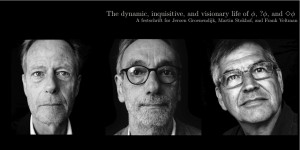Benjamin Spector, Corien Bay & Emar Maier, Guillaume Thomas, Andreea Nicolae, Florian Schwarz & Jacopo Romoli, Maribel Romero, Berit Gehrke & Louise McNally, Lelia Glass, Moshe Levin & Daniel Margulis, Gregory Scontras, Cheng-Yu Edwin Tsai, Kenneth May, & Maria Polinsky, Yaron McNabb & Doris Penka, Kristina Liefke, Gennaro Chierchia, David Barner, Salvador Mascarenhas, Michael Yoshitaka Erlewine, Jeremy Kuhn, Karlos Arregi, Itamar Francez, & Martina Martinovic, Mythili Menon & Roumyana Pancheva.
Monthly Archives: January 2014
The dynamic, inquisitive, and visionary life of ?, ??, and ??
A festschrift for Jeroen Groenendijk, Martin Stokhof, and Frank Veltman.
Johan van Benthem: Suave radicals. “While the inner sanctum of the Montague system are eternal homomorphisms between the algebras of natural and formal languages, GSV started looking at the dynamic agency behind natural language, as was also done by Lewis, Stalnaker and Kamp, but quickly developing one seminal new theme after another in their own distinctive style at the interface of semantics and pragmatics. One of these themes is the nature of information, perhaps the main currency created and conveyed by natural language. Look at the data semantics of Veltman, or the early work of Groenendijk & Stokhof with van Emde Boas on knowledge, and you will see how this played around 1980. The other main theme, forming a natural unity with the first, is communication between language users, which eventually led to dynamic semantics of the 1980s and 1990s, with classics such as Dynamic Predicate Logic and Defaults in Update Semantics where the potential for changing hearer information is at the heart of the meaning of linguistic expressions. These ideas were developed by paying close attention to carefully selected facts from natural language, concerning anaphora, questions, and conditionals, the way expert geologists detect the presence of gold seams by looking at small, but telling facts of rock coloring or vegetation. In doing all this, GSV achieved something that is rare for academics: they set the international agenda of research of their field, instead of following it.”
Hans Kamp: Selected Papers
From interview with Alice ter Meulen: “The lack of mutual interest between Chomsky and Montague – to the extent that there was any perception of the other’s achievements, it seems to have been largely negative – may seem strange in one way, since they were motivated by the same deep insight and concern: that natural languages, for reasons that we now find commonplace, but that weren’t at the time, were subject to far greater systematicity than had been assumed until then or at least than anyone had been prepared to openly assert. The relation between form and meaning, they both saw clearly and posited emphatically, had to be essentially lawlike, and for natural languages this had to be in some important sense by ‘design’ – just as for formal languages, even if the designing and the designers were different.”
Mapping Possibilities
[youtube]https://www.youtube.com/watch?v=DAzSSEPJI2A[/youtube]



